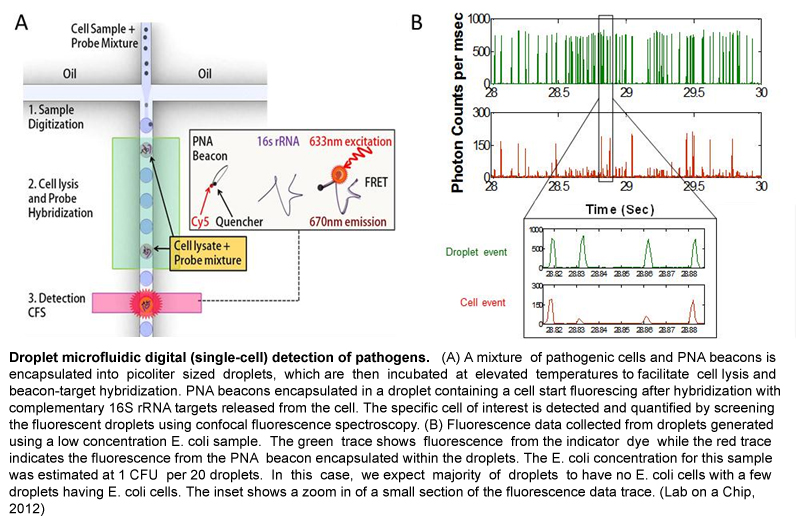Our lab focuses on the development of new technologies for molecular analysis and biomedical research via advances in micro- and nano-scale sciences. We aim to develop new methods, devices and systems with unprecedented performance characteristics, such as sensitivity, specificity, resolution (temporal and/or spatial), multiplexing and throughput to rectify current technological limitations in the molecular study of diseases. In addition, we are moving beyond basic research into translational studies by developing and applying new technologies that address practical biomedical problems and clinical needs. By forging long-term collaborations with medical scientists and physicians across various disciplines (e.g. Oncology, Pathology, Surgery and Emergency Medicine) and by leveraging our engineering innovations in microfluidics, single molecule spectroscopy and functional nanoparticles, we are developing genetic and epigenetic biomarker-based diagnostics for cancer and an array of other diseases.
 Quantum Dots for Genetic and Epigenetic Detection of Cancer
Quantum Dots for Genetic and Epigenetic Detection of Cancer
 Single Molecule Analysis of Genomic Content
Single Molecule Analysis of Genomic Content
 All-in-One Microfluidic Diagnostics: Sample Preparation, Target Detection and Integration
All-in-One Microfluidic Diagnostics: Sample Preparation, Target Detection and Integration
 Droplet Microfluidics for High-Resolution and High-Throughput Screening
Droplet Microfluidics for High-Resolution and High-Throughput Screening
Droplet-based microfluidic systems have introduced otherwise ‘analog’ microfluidic systems (i.e. continuous flow microfluidics) to the benefits of the ‘digital’ operation format. Analogous to the benefits of digital technology in electronics, droplet microfluidics allows ‘digital operations’ like mixing precise reagent quantities, splitting a reagent into precise small volumes etc. possible in microfluidic systems. Such digital operations can be very beneficial in biological analyses. For instance, amplification of individual DNA molecules by separating them from each other using DNA sample splitting into small volumes, i.e. digital PCR, can be used for quantification of DNA and sensitive detection of rare mutant DNA present in the background of a large number of wild-type DNA.
We developed a droplet microfluidic chip that enables quantitative genetic detection of infectious pathogens at the single cell resolution. The device streamlines multiple functionalities such as sample digitization into droplets, cell lysis, probe-target hybridization, and fluorescent detection. A peptide nucleic acid fluorescence probe is used to detect 16S rRNA released from a pathogenic cell encapsulated in a pL-sized droplet, thereby achieving digital detection. By coupling with CICS to interrogate sub-cellular contents, we further achieved amplification-free single molecule detection within a droplet, promising for high-throughput and high-resolution genetic analysis.


